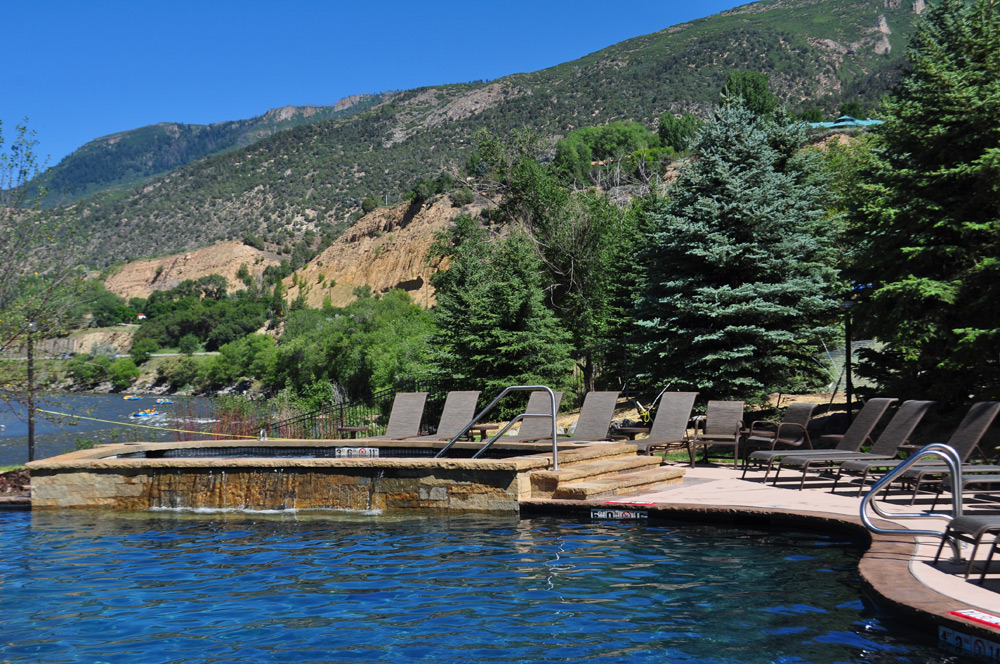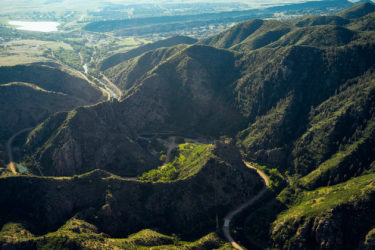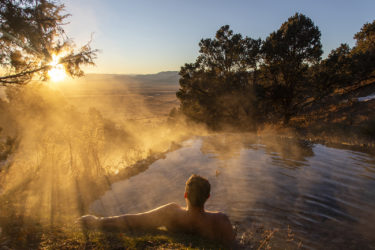The Local newsletter is your free, daily guide to life in Colorado. For locals, by locals.
Colorado locals and visitors alike have long journeyed three hours west of Denver to soak and play in the warm waters of the Glenwood Hot Springs Pool. But now, Glenwood Springs’ most popular attraction is getting some friendly competition.
Iron Mountain Hot Springs, which opened in July about a half-mile west of the city’s original hot springs pool, offers a more intimate, relaxing experience than its crosstown rival, which bills itself as having the world’s largest hot springs pool.

Following the model of southwest Colorado’s Pagosa Springs Resort, the Iron Mountain resort provides an assortment of soaking pools in various shapes, sizes, and temperatures, set amidst heated terraces and walkways (for wintertime comfort) and overlooking the Colorado River. Fed by natural hot springs, it features a wheelchair-accessible 70-foot-by-35-foot freshwater family pool heated by geothermal exchange to 93 degrees, and an adjoining 102-degree whirlpool spa.
But what really sets Iron Mountain apart are its 16 smaller soaking pools, ranging from 98 to a toasty 108 degrees, filled with mineral-laden water rich in iron, sulfate, calcium, chloride, and sodium. The variety of pools—each with a different name, water temperature, and view—creates an almost irresistible urge to move from pool to pool, in search of a combination that’s just right.
(Check out 5280‘s First-Timer’s Guide to Glenwood Springs)
Iron Mountain Hot Springs has a colorful history dating back to at least 1896, when entrepreneur Bob Ware, a former Garfield County Sheriff, purchased the property and developed it into a men’s health spa and bathhouse—at one point offering 15 baths for one dollar. The property operated under various names and owners over the next century, before being razed in the 1990s to make way for potential development plans, which never materialized.
Current owners Steve and Jeanne Beckley, who are redeveloping the property with partners Mogli and David “Coop” Cooper, have a knack for spotting neglected tourism opportunities. In 1999, they reopened the nearby Fairy Caves attraction, which had been closed for more than 80 years. Since then, their original cave tours business has evolved into the popular Glenwood Caverns Adventure Park, a western-themed mountaintop amusement park that’s accessible by riding up a steeply inclined gondola.
So what sets Iron Mountain apart from the tried-and-true Glenwood Hot Springs? The original Glenwood pool, which stretches nearly the length of two downtown city blocks, is the centerpiece of a sprawling spa, health club, and lodge complex that attracts thousands of visitors on busy days. Its active amenities include a diving area, lap lanes, a pair of giant water slides, and even mini-golf.
Iron Mountain Hot Springs, on the other hand, is designed to serve only 300 visitors at a time, in a natural riverside setting focused on peaceful relaxation. Soft music plays in the background, and children under 14 must be accompanied by an adult to venture into the “quiet zone” surrounding about half of the soaking pools (children under 5 are not allowed in this area). Another indulgent touch is the enthusiastic wait staff at the on-site Sopris Café, who will gladly take drink and food orders for poolside delivery and enjoyment.
No matter what you’re looking for, you’d be hard-pressed to find a better way to spend a few hours (or more) in Glenwood than to indulge in the soothing waters of either hot springs.
A Tale of Two Hot Springs
Want to see how these establishments stack up? Here’s everything you need to know:
| Glenwood Springs Pool | Iron Mountain Hot Springs | |
| Year Opened | 1888 | 2015 |
| Size (feet) | ||
| -Main Pool | 405’ x 100’ | 70’ x 35’^ |
| -Smaller Pool(s) | 100’ x 80’ | varies |
| Volume (gallons) | 1.07 million | 86,000^ |
| Temperatures | ||
| -Main Pool | 90 degrees | 93 degrees |
| -Smaller Pool(s) | 104 degrees | 98–108 degrees |
| Admission | ||
| -Adults | $15.75–$21* | $25 |
| -Children | $10.75–$12.75* | $15 |
*Rates vary by season. Both resorts offer evening-only rates
^Main family pool only.
Russ Arensman is a Glenwood Springs-based freelance writer.











